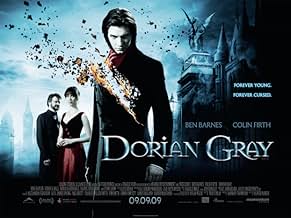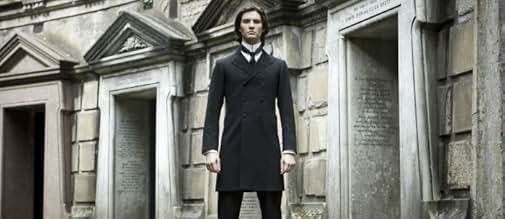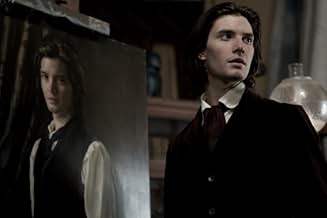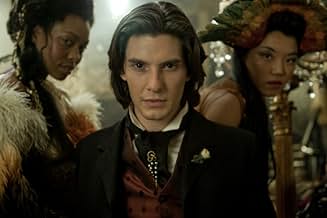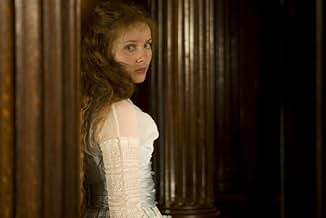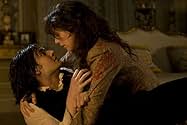AVALIAÇÃO DA IMDb
6,2/10
70 mil
SUA AVALIAÇÃO
Um jovem corrupto, de alguma forma, mantém sua beleza juvenil para sempre, mas uma pintura especial revela sua feiúra interior a todos.Um jovem corrupto, de alguma forma, mantém sua beleza juvenil para sempre, mas uma pintura especial revela sua feiúra interior a todos.Um jovem corrupto, de alguma forma, mantém sua beleza juvenil para sempre, mas uma pintura especial revela sua feiúra interior a todos.
- Prêmios
- 1 indicação no total
Jeff Lipman
- Lord Kelso
- (as Jeffrey Lipman Snr)
- Direção
- Roteiristas
- Elenco e equipe completos
- Produção, bilheteria e muito mais no IMDbPro
Avaliações em destaque
The darkly amoral Oscar Wilde novel "The Picture of Dorian Gray" is one of my favourites and naturally lends itself to both theatrical and cinematic dramatisations with its gripping story-line and sharply-drawn characters. This latest adaptation takes some liberties with the story-line in giving a possible reason for Dorian Gray's headlong dive into hedonism in the form of a bullying father who locked and beat his young self in the attic where he's forced to hide the offending portrait, introduces Henry Wotton's daughter as a love interest and moves the action on in time to the First World War, although the source is so strong, I don't think it needs embellishment.
The Gothic element in the story is frankly maxed out as Doran descends the slippery slope to corruption, in short order corrupting a young actress who falls in love with him, deflowering a young virgin at her coming-out ball (and her mother too!) indulge in a homosexual act with his artist friend, before bottoming out with outright murder. These scenes are lurid in their depiction and justifiable I suppose in demonstrating the levels of depravity Doran Gray has sunk to. Less convincing for me in particular were the back- story of his troubled childhood as it weakened the influence on his character of the Machiavellian all-talk-no-action Henry Wooton character plus I think the action should have been contained within the Late Victorian London era, even allowing for Dorian's ageing.
All the British cast acquit themselves admirable, Ben Barnes very good as the eternally young devil-may-care Dorian, Ben Chaplin, fine as the doomed artist Basil and especially Colin Firth as Wooton, who initially inspires and encourages Dorian's increasingly heartless actions but who realises in the end the monster behind the facade that he as helped foster.
The key climactic scene where Dorian confronts his own self-image is excitingly done and indeed the film plays like a thriller in terms of pace.
In general though I think the director placed too many logs on the fire and sacrificed narrative flow and character motive in so doing, but at least the film was exciting and always trying to move forward, the London exteriors of the 1890 in particular
The Gothic element in the story is frankly maxed out as Doran descends the slippery slope to corruption, in short order corrupting a young actress who falls in love with him, deflowering a young virgin at her coming-out ball (and her mother too!) indulge in a homosexual act with his artist friend, before bottoming out with outright murder. These scenes are lurid in their depiction and justifiable I suppose in demonstrating the levels of depravity Doran Gray has sunk to. Less convincing for me in particular were the back- story of his troubled childhood as it weakened the influence on his character of the Machiavellian all-talk-no-action Henry Wooton character plus I think the action should have been contained within the Late Victorian London era, even allowing for Dorian's ageing.
All the British cast acquit themselves admirable, Ben Barnes very good as the eternally young devil-may-care Dorian, Ben Chaplin, fine as the doomed artist Basil and especially Colin Firth as Wooton, who initially inspires and encourages Dorian's increasingly heartless actions but who realises in the end the monster behind the facade that he as helped foster.
The key climactic scene where Dorian confronts his own self-image is excitingly done and indeed the film plays like a thriller in terms of pace.
In general though I think the director placed too many logs on the fire and sacrificed narrative flow and character motive in so doing, but at least the film was exciting and always trying to move forward, the London exteriors of the 1890 in particular
The Picture of Dorian Gray, as penned by the Irish wit Oscar Wilde (1854 - 1900), is a tale of high-brow debauchery and limitless pleasures of body and soul and the corruption, by one Lord Henry Wotton, of the young, handsome and soon to be narcissistic 19th century rock 'n roll hell-raiser Dorian Gray.
Ealing Studios have translated Wilde's controversial novel into a celluloid den of iniquity that somehow comes across as rather shallow. Like the characters seen here too; it seems that as a work of symbolic gesture of how the upper classes conduct their sordid lifestyle of hypocrisy, deceit and lust it lacks any deep and thoughtful intrigue that any good 19th century Gothic horror story should be.
To fully understand the ethics of a Victorian London that Oscar Wilde has so wonderfully reflected with his novel here, we see, too, with this latest interpretation using, as Wilde may have done, the picture purely as a metaphorical means. Yes, we see the selling of souls here and the lamb to the slaughter and the hedonistic teachings of Lord Wotton, but toward the end, the whole sordid affair becomes predictable.
Penned with an undercurrent of realism and too fantasy of the love of sin. It's a dark, dirty, dingy setting of a self-indulgent Victorian London that we are lead to believe is prim and proper on the surface but lurking just below this weak, temperate society lies pure greed, greed for experience, experience that will transcend the mind, body and soul to the wondrous dealings of what life has to offer. For, as always, a price, a price both Oscar Wilde and Dorian Gray would pay the highest sacrifice.
It is with a taint of sorrow that this latest performance too has paid a price too high, sensationalism over content, ironies aside, the film seems too concerned to show the sordid details of this lifestyle and its inhabitants'. It lingers on too far in the bedrooms of London and strays too far from the mental anguish that may have been. We see the trouble mind of our young (looking) man but we see not enough of his fears, regrets, sorrows and repentance, which are cast aside and squandered. Welcome to the 21st century Mr. Wilde.
By the time the chimes of time are echoing in the distance we have Dorian fading into the far reaches of the eternal abyss of the afterlife. With all the time in the world we are still wanting more to feed our palates, it's all to aesthetically pleasing, but at the same time oh so unrewarding, a taster we are given but the full flavour we are, regrettably, spared.
This too may have its target audience and in so having picked its target out it may have trouble standing the test of time, due to its lack of wit, lack of diversity and a lack of daring and commitment of its original source. It is a sad loss that such a literary work of historical meaning and wealth should have been robbed of its qualities.
Ealing Studios have translated Wilde's controversial novel into a celluloid den of iniquity that somehow comes across as rather shallow. Like the characters seen here too; it seems that as a work of symbolic gesture of how the upper classes conduct their sordid lifestyle of hypocrisy, deceit and lust it lacks any deep and thoughtful intrigue that any good 19th century Gothic horror story should be.
To fully understand the ethics of a Victorian London that Oscar Wilde has so wonderfully reflected with his novel here, we see, too, with this latest interpretation using, as Wilde may have done, the picture purely as a metaphorical means. Yes, we see the selling of souls here and the lamb to the slaughter and the hedonistic teachings of Lord Wotton, but toward the end, the whole sordid affair becomes predictable.
Penned with an undercurrent of realism and too fantasy of the love of sin. It's a dark, dirty, dingy setting of a self-indulgent Victorian London that we are lead to believe is prim and proper on the surface but lurking just below this weak, temperate society lies pure greed, greed for experience, experience that will transcend the mind, body and soul to the wondrous dealings of what life has to offer. For, as always, a price, a price both Oscar Wilde and Dorian Gray would pay the highest sacrifice.
It is with a taint of sorrow that this latest performance too has paid a price too high, sensationalism over content, ironies aside, the film seems too concerned to show the sordid details of this lifestyle and its inhabitants'. It lingers on too far in the bedrooms of London and strays too far from the mental anguish that may have been. We see the trouble mind of our young (looking) man but we see not enough of his fears, regrets, sorrows and repentance, which are cast aside and squandered. Welcome to the 21st century Mr. Wilde.
By the time the chimes of time are echoing in the distance we have Dorian fading into the far reaches of the eternal abyss of the afterlife. With all the time in the world we are still wanting more to feed our palates, it's all to aesthetically pleasing, but at the same time oh so unrewarding, a taster we are given but the full flavour we are, regrettably, spared.
This too may have its target audience and in so having picked its target out it may have trouble standing the test of time, due to its lack of wit, lack of diversity and a lack of daring and commitment of its original source. It is a sad loss that such a literary work of historical meaning and wealth should have been robbed of its qualities.
I am not an expert at writing reviews, but I so strongly disagreed with the review originally posted for this movie that I had to express a counter point of view. To me, the best thing about this movie was the acting. Ben Barnes is completely riveting and I'm not some teenage girl that things he's just so cute. He had such a strong on screen presence, I almost confused him with Ben Whipshaw who did a movie called "Perfume" and both actors in each of these performances are exceptional. It's fun to watch period pieces for the set design and costumes. Again, this movie did not disappoint. I have read Oscar Wilde's story and always found Wilde to come across as a bit enamored at his own cleverness. This script flows. The dialog comes across as witty and not pompous. The script does justice to the work. It is definitely worth the time to watch.
Very good adaption with a nicely chosen cast with some fresh and familiar faces. Thought provoking about pleasure vs happiness like the themes of the namesake book it's based on. The main character's looks is important to the film and the actor delivers his change from innocence to experience to corruption pretty well.
A bit too long in the last arc. Not entirely sure about the final scene or it's contribution to the film-so the man responsible for corrupting Dorian revenges on him for bedding his daughter. Does he do any self reflection at all for his own suggestions and encouragement that led Dorian down this path? It seems to me like the film is missing this angle of development. This is an example of a missing layer of thematic complexity that prevents me from giving a higher score.
I don't recall the book that much but there might be a few innovations in this film such as the same sex scenes (since the author Oscar Wilde I believe was homosexual) and the motivation of Dorian to change and to compel him to his final act.
A bit too long in the last arc. Not entirely sure about the final scene or it's contribution to the film-so the man responsible for corrupting Dorian revenges on him for bedding his daughter. Does he do any self reflection at all for his own suggestions and encouragement that led Dorian down this path? It seems to me like the film is missing this angle of development. This is an example of a missing layer of thematic complexity that prevents me from giving a higher score.
I don't recall the book that much but there might be a few innovations in this film such as the same sex scenes (since the author Oscar Wilde I believe was homosexual) and the motivation of Dorian to change and to compel him to his final act.
When I first heard about the Picture of Dorian Gray becoming a movie I was excited and overjoyed. I thought with this new technology the 21st century has, The Picture of Dorian Gray will receive the justice it deserves. However, I was very wrong. I just finished watching the movie and I felt compelled to write a review about it.The movie was horrible. A grand disappointment which had such potential to be great. Firstly, the movie should have claimed to be inspired by the novel not based on it. I say this because the movie was very different from the novel. All of Oscar Wilde's wit and beauty which truly made the novel classic was ruined and overshadowed by the changes the movie made. I understand that there can be biased when reading a novel before seeing the movie adaption, but this movie adaption was appalling. I wont give anything away but the movie seriously ruined Oscar Wilde's vision and above all his memorable characters. Once the movie changed aspects in the novel the whole thing became horrible. Trust me, you'll agree if you've read the novel first.
Ben Barnes is simply gorgeous but he hardly brought any character development. I never felt pity for him throughout the movie compared to the novel. The novel brought the characters to life and described the reality of London life. The movie made the classic novel very shallow. I must add that as much as I love Colin Firth he was not convincing as Lord Henry. The character was someone who was vindictive and unchanging. He drained Dorian and was never affected by the consequences of his own evil; Colin Firth failed at reincarnating the abhorred character. Whats worse is that the whole ending is changed, which ruins the whole message of the novel. In the end, Oscar Wilde's masterpiece remains legendary in its pages as opposed to its film adaption. Seriously, I think my rate of 4 is being to generous.
Ben Barnes is simply gorgeous but he hardly brought any character development. I never felt pity for him throughout the movie compared to the novel. The novel brought the characters to life and described the reality of London life. The movie made the classic novel very shallow. I must add that as much as I love Colin Firth he was not convincing as Lord Henry. The character was someone who was vindictive and unchanging. He drained Dorian and was never affected by the consequences of his own evil; Colin Firth failed at reincarnating the abhorred character. Whats worse is that the whole ending is changed, which ruins the whole message of the novel. In the end, Oscar Wilde's masterpiece remains legendary in its pages as opposed to its film adaption. Seriously, I think my rate of 4 is being to generous.
Você sabia?
- CuriosidadesThe original Dorian Gray has blond curly hair and blue eyes.
- Erros de gravaçãoWhen Dorian is fighting Jim in the train station tunnel, the sleepers and spikes are visible. The spikes seen were not in use in 1890 when the novel was written, nor the era when the film is set.
- Citações
Lord Henry Wotton: There's no shame in pleasure. Man just wants to be happy. But society wants him to be good. And when he's good, he's rarely happy. But when he's happy, he's always good.
- Cenas durante ou pós-créditosAt the start of the closing credits, they fade in and out, alternating with images of the Portrait peeking through, as though it is trying to assert itself.
- Versões alternativasDuring post-production, the film was tailored for a '15' certificate in the UK. According to the BBFC, the filmmaker cuts were as follows:
- A scene in which a tea party is inter-cut with shots showing Dorian's sadomasochistic excesses was toned down to remove or reduce the more explicit moments (explicit sight of a fingernail being pulled off, explicit sight of a chest being cut with a razor in a sexual context, explicit sight of blood being sucked from a woman's breasts and sight of a restrained man being beaten).
- Additionally, a murder scene was toned down to remove the sense of dwelling on the infliction of pain and injury (reduction in the number of stabbings, removal of a blood spurt from man's neck, reduction in sight of victim choking on his blood).
- ConexõesFeatured in Lost in Adaptation: The Picture of Dorian Gray 2009 (2020)
Principais escolhas
Faça login para avaliar e ver a lista de recomendações personalizadas
Detalhes
- Data de lançamento
- País de origem
- Central de atendimento oficial
- Idioma
- Também conhecido como
- El retrato de Dorian Gray
- Locações de filme
- Empresas de produção
- Consulte mais créditos da empresa na IMDbPro
Bilheteria
- Faturamento bruto mundial
- US$ 22.873.653
- Tempo de duração
- 1 h 52 min(112 min)
- Cor
- Mixagem de som
- Proporção
- 1.85 : 1
Contribua para esta página
Sugerir uma alteração ou adicionar conteúdo ausente




